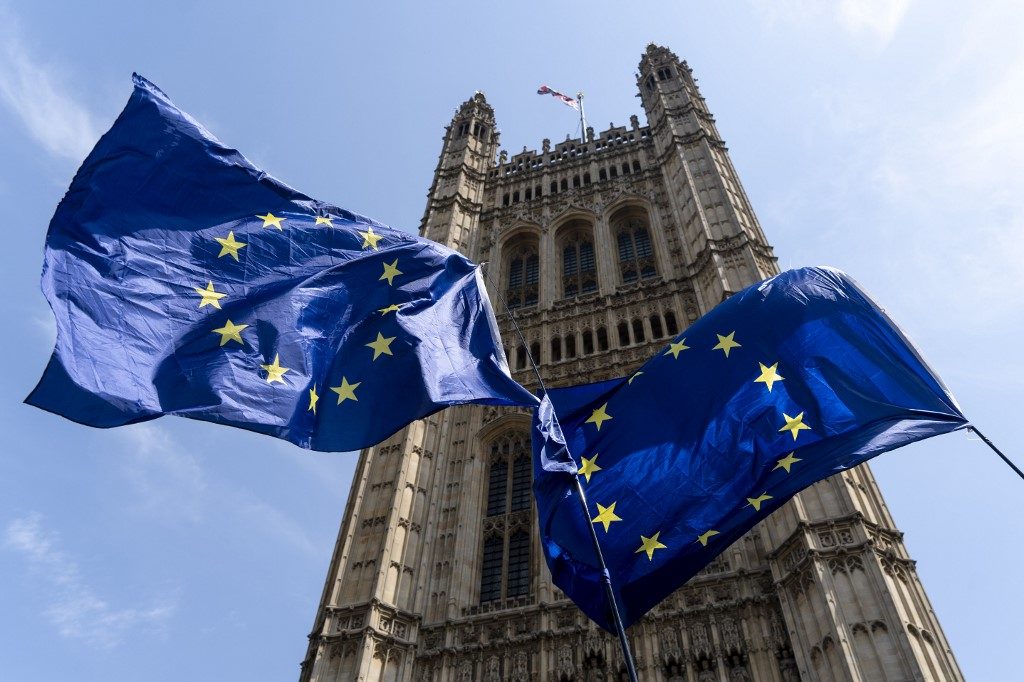SUMMARY
This is AI generated summarization, which may have errors. For context, always refer to the full article.

LONDON, United Kingdom – British Prime Minister Boris Johnson was seeking Tuesday, December 17, to outlaw extending the Brexit transition period beyond the end of 2020, a move that wiped out sterling’s gains since his re-election.
Johnson won a big majority in last week’s general election on a promise to “get Brexit done” by taking Britain out of the European Union by the end of January.
A transition period will then follow, during which London and Brussels hope to negotiate a trade agreement before the end of December next year.
Some European leaders have said the 2020 deadline would be too tight to complete a comprehensive accord, reviving fears of a “no-deal” outcome that could cause fresh uncertainty and chaos.
That was enough to pull the pound sterling lower in late trading in New York, a trend that continued in Asian and European currency trading.
Johnson held his first cabinet meeting since the election on Tuesday, welcoming back his ministers after what he called a “seismic” result.
“The voters of this country have changed this government and our party for the better and we must repay their trust now by working flat out to change our country for the better,” he said during the meeting at his Downing Street office.
The government’s domestic agenda should be focused on social justice, better infrastructure and “extending opportunity across the whole of the United Kingdom,” he added.
House of Commons returns
Parliament returns on Tuesday, to install a speaker and swear in MPs. Queen Elizabeth II sets out the government’s legislative program on Thursday, December 19, and Johnson plans to put the EU Withdrawal Agreement Bill before lawmakers on Friday, December 20.
But the government is planning to block the transition period from going beyond the end of 2020, in a symbolic statement of intent.
“We will not extend the implementation period and the new Withdrawal Agreement Bill will legally prohibit government agreeing to any extension,” a Downing Street source said.
But Irish Foreign Minister Simon Coveney told Irish broadcaster RTE: “I think the EU will find it strange that the UK is essentially closing off options that it itself could use later on in the process should they choose to.”
Johnson spoke on the phone with the new European Commission President Ursula von der Leyen and the pair agreed to start trade talks as soon as possible, London and Brussels said.
“We agreed to launch negotiations ASAP on future EU-UK partnership. We will meet at the beginning of 2020. The UK will always be a friend, partner and ally,” she tweeted.
Johnson’s spokesman added: “They both said they will work with great energy to achieve the future partnership by December 2020.
“Now, with absolute clarity on the timetable we’re working to, the UK and the EU will be able to get on with it and have a great future relationship wrapped up by December 2020.”
The spokesman confirmed Britain was still targeting a “Canada-style” free trade agreement.
‘Performance theater’
Sam Lowe, from the Centre for European Reform think-tank, said there would a lot of “performance theater” from the government in the next 6 months to fulfil Johnson’s Brexit pledge.
“The landing zone for the negotiation probably won’t emerge until later next year,” he wrote on Twitter.
“For a deal to be reached in the space of 11 months, the UK will need to concede to most of the EU’s demands. Politically, Johnson can’t concede without having put up a jolly good fight first, and alternative needs to be something worse.”
The Confederation of British Industry (CBI) business lobby said there was no time to lose in striking a good trade deal as quickly as possible.
“Business has had enough of uncertainty and shares the prime minister’s ambition for a fast EU trade deal,” said CBI director-general Carolyn Fairbairn.
The announcement saw the pound sterling currency sink by as much as 1.25% against the dollar, having surged following Johnson’s election victory.
The British currency was down at $1.3198 at around 1145 GMT from $1.3332 at 2200 GMT on Monday, December 16.
Meanwhile the euro was up at 84.57 pence from 83.59 pence.
Andy Scott, an analyst at financial services group JCRA, said sterling’s “impressive gains” since the election result had been completely wiped out.
“The clock is now ticking down to a firm cliff-edge (no-deal Brexit) next December.” – Rappler.com
Add a comment
How does this make you feel?
There are no comments yet. Add your comment to start the conversation.